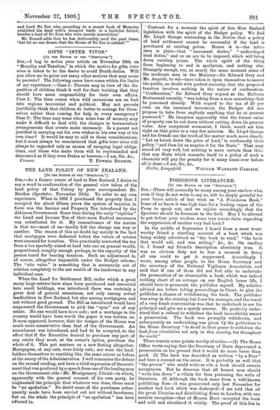THE LAND POLICY OF NEW ZEALAND.
[To THE EDITOR Or THE " SPECTATOR:] Sin,—As a former owner of land in New Zealand, I desire to say a word in confirmation of the general view taken of the land policy of that Colony by your correspondent Mr. Burdon (Spectator, November 20th). To refer to my own experience. When in 1882 I purchased the property that I occupied for about fifteen years the system of taxation in force was the Income and Property Tax introduced by the Atkinson Government. Some time during the early "eighties " the Land and Income Tax of their more Radical successors was substituted for it. My remembrance of the matter is that we—most of us—hardly felt the change one way or another. The reason of this no doubt lay mainly in the fact that mortgages were deducted before the values of estates were assessed for taxation. This practically converted the tax from a tax specially aimed at land into one on general wealth, proportioned, roughly enough perhaps, to the capacity of the person taxed for bearing taxation. Such an adjustment is, of course, altogether impossible under the Budget scheme. The " site value " is something that is necessarily out of relation completely to the net wealth of the landowner in any individual case.
When the Land for Settlement Bill, under which a great many large estates have since been purchased and converted into small holdings, was introduced there was certainly a great deal of general uneasiness, not only among actual landholders in New Zealand, but also among mortgagees, and not without good ground. The Bill as introduced would have empowered the Government to pick the " eyes " out of any estate. No one would have been safe ; not a mortgage in the country would have been worth the paper it was written on. It soon appeared, however, that the temper of the House was much more conservative than that of the Government. An amendment was introduced, and had to be accepted, to the effect that if the Executive desired to purchase any part of any estate they must, at the owner's option, purchase the whole of it. This put matters on a new footing altogether. Mortgagees, at any rate, were fairly safe; nor were the land- holders themselves to anything like the same extent as before at the mercy of the Administration. I well remember the debate on the second reading, and have a vivid impression of the senti- ment that was produced by a speech from one of the leading men on the Government side—Mr. Montgomery, I think—in which, apparently with the general consent of his own party, he emphasised the principle that whatever was done, there must be "no spoliation." No doubt some of the purchases subse- quently made have been carried out not without harshness, but on the whole the principle of " no spoliation " has been adhered to. •
Contrast for a moment the spirit of this New Zealand legislation with the spirit of the Budget policy. We find Mr. Lloyd George contending in the Nation that a policy of land settlement cannot be successful if the land is purchased at existing prices. Hence it is—the infer- ence is plain—that " increment duties," " undeveloped land duties," and so on are to be imposed, which will bring down existing prices. The whole spirit of the thing from beginning to end is spoliation, and nothing else. Strangely enough, too, at nearly the same moment some of the moderate men in the Ministry—Sir Edward Grey and Mr. Asquith, to wit—have taken it upon themselves to assure the public, no doubt with perfect sincerity, that the proposed taxation involves nothing in the nature of confiscation. " Confiscation," Sir Edward Grey argued at the Holborn Restaurant recently, "was taking from a man something that be possessed already. With regard to the tax of 20 per cent. on the unearned increment, the Budget did not propose to take from anybody anything that he at present possessed." He imagines apparently that the future value of property can be cut down without cutting down its present value. Any competent economist, I think, would set him right on that point in a very few minutes. Mr. Lloyd George and his friends see the truth of the matter much more clearly. " Let us knock down the price of land," is confessedly their policy, " and then let us acquire it for the State." That may sound all very well, but nothing is more certain than this: that any State which commits itself to a policy of such a character will pay the penalty for it many times over before all is done.—I am, Sir, &c., Nellie, Limpsfield. WILLIAM WARRAND CARLILE.














































 Previous page
Previous page